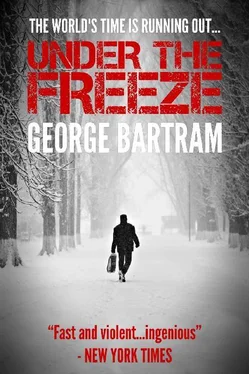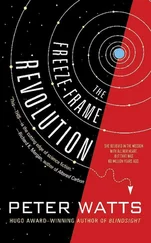He hustled them into a taxi. There was, indeed, a small neon sign that read only Rose on the left side of Camberwell New Road, shocking pink against a particularly black stretch of ugly building. It seemed to mark no doorway, no shop or restaurant.
Barnwell had pulled the cycle into the shadow of a building, and he was lurking sullenly with his haunches up on the rear fender.
“Hello, Jenny.”
Barnwell sighed. A slight odor of alcohol drifted between them. Barnwell was wearing a black leather jacket and leather pants and sunglasses. “Where’s your friend?” he said.
“Don’t be a smart-ass, Jenny. Nobody loves a smart-ass.”
“Nobody loves a hard case, either. Christ, what am I doing, messing about with you again? I swore I’d never do it.”
“I pay well.”
“Bloody hands, that’s what you’ve got — fucking bloody hands. Bloody well better pay well, the hands you got.”
Tarp gave him a hundred-pound note. Barnwell sighed again. “Nobody’ll crack a note like this where I come from,” he whined.
“Life is hard, Jenny. Want to do a job for me?”
“Wot, another?”
“Yes.”
“Oh, Christ! Well, all right, if it pays. You’re fucking Mephistopheles, you know, seducing my innocence?”
“Give me a number where you can pick up a message. I’ll leave a time. Add three hours to that time and call me here.” Tarp gave him a slip of paper with the number of a phone booth near Russell Square.
“Wot’s this, then, cops and robbers?”
“Spies and hard cases. It’s the new fad.” He signaled to Repin, who got slowly out of the cab and lumbered toward them. “Don’t cross him,” Tarp murmured. “He’s very tough.”
“Christ, if he’s a friend of yours, I wouldn’t dare say Ta to him. Wot you take me for?”
Tarp introduced them in the most cursory sort of way, using no names. They appraised each other and were, it seems, about equally appalled.
“Mind your manners with each other,” Tarp said. “Jenny, I’ll call you. Remember what I said.”
“Yes, Mum. I’ll be a good boy.”
He touched Repin’s shoulder. “ Dormez bien , monsieur .”
Barnwell kicked the big cycle into a roar and, without a word to Repin or Tarp, took it down over the curb and into the street. Tarp saw Repin’s arms go around the leather-clad waist, and then they were up the road, and he could hear them long after the tail light had disappeared.
Tarp went back to his Bloomsbury hotel. As he slipped into sleep his last thought was of Maxudov, the faceless power who seemed able to check him now at every move.
He awoke from a dream of anger and lay in the strange bed keeping it alive. A man who had tried to teach him martial arts long, long before had been in it; and Juana had been in it. The dream had been erotic; he had the evidence of his body for that. They had been coupled, he and Juana; there had been some fear of interruption. “Your lesson, your lesson,” she had said. Then — or had it been earlier? Or had he dreamed it several times, so that each preceded and followed each — that awesome battler from his past had tried to teach him self-protection.
I was always afraid of him . Tarp scowled into the dark room. I was always on the defensive .
The teacher had been Maxudov, he realized. Yes, he was certain of it now. Somehow, in the cocoon of the mind, the unknown Maxudov had metamorphosed into the long forgotten teacher. And put me on the defensive .
There was the source of the anger. Tarp stood up, naked. Because I’ve been two moves behind him ever since I got to Cuba . I haven’t been able to make a move . I’ve done nothing but react .
He left the little hotel before the front door was unlocked, letting himself out into a silent street where the day was only a gray wash by which the eye could distinguish a tree from a car, an iron paling from a building half a block behind it. The dream stayed with him like vapor trailing from an engine. On the defensive . He could not stop being angry.
He found himself resenting Juana’s messenger and this trip to Paris. He ought to be doing something different. He ought to be making his own move; he ought to be on his way to Moscow. Now Maxudov had made that more difficult by negating Repin.
A taxi put him down near the Opera before ten. He had not been in Paris for a year, but it was not a city he greatly cared for. Still, it had been the center of the world for him at one time, and so he returned to it with a certain curiosity, as if he might find himself walking down one of its side streets, a slight, perhaps not remarkable adolescent. It was hard for him not to look at Paris as if it, too, partook of his dream, so firm was the grip of the night on him. He began to walk. He passed a building where a trading company had in other days had an office, actually a front for French intelligence. He walked down toward the Quai d’Orsay, then turned away from it. He had been in and out of Paris a lot just after Dien Bien Phu, putting a network together from the shreds the French had left behind. Now he was gone from Southeast Asia and other people had patched his nets and put something new together. He saw Paris mostly in that context, as a place where he had begun something that had failed. Perhaps surprisingly, he was not made sad by the place and its reminder of failure; far less was he made bitter by it. He had learned that from his French mentors, who had known so much failure that they accepted eventual failure as part of the learning process that is history.
In the dream he had had only one eye. No wonder he had been on the defensive.
Dreams were a form of thought, perhaps a form of learning. They spoke in puns and seeming riddles, as oracles used to speak to the antic half of the brain. He thought of all the sayings about eyes: to see with half an eye; he closed one eye to; in the kingdom of the blind, the one-eyed man; to have eyes to see. I - eye . With only half of I .
He was passing Palais Royal, but his inner vision was so startling that he stopped where he was and almost collided with a woman coming behind him. A dark circle of water like an iris in an ocean of white — the polynya like a dark eye in the ice . Had he read that? Or was it simply the ability to see in metaphor?
He turned left around Palais Royal and made his way toward the Pont Neuf; on the bridge itself he began to overtake clusters of people moving toward the Left Bank. Many of them were young, but some were middle-aged and older; he thought he recognized Scandinavians and Germans, a few East Indians, and here and there an African in a bright-colored printed cloth over wanner European clothes. He heard English spoken, recognized the nasality and the hard r’s of American. There were many French. An unusual sense of community prevailed, and he looked more closely at the signs on the lampposts and on the placards that some of the people were carrying. Givrage mondiale . Journée de paix atomique . A young woman with pretty breasts was wearing a shirt that read Veux - tu qu’on les bruler ? Some of the signs had been tied to the posts with string and hung down slackly, like masks pulled down around their wearers’ necks. Journée de témoignage contre la guerre atomique , with an arrow pointing ahead — Day of witness against atomic war.
A girl pinned a button on his coat. It was white. In blue letters in a circle was the single word Givrage : Freeze. She smiled up at him, then kissed him with an impulsiveness that was easy and erotic. Some image from the dream flashed: Juana, a kiss, her beautiful face.
Читать дальше












